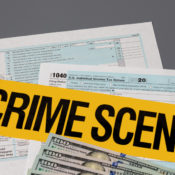Are You Having an Identity Crisis?
You walk into a department store to make a purchase. You take your selection to the cashier and write a check. On that check is your name, address, and home phone number, the name of your bank and its address, and your bank account number. The cashier asks for your driver’s license. In nine states, the license number is your Social Security number. The cashier memorizes the birth date on your license and then asks for your work phone number, which will give them the name and address of your employer. A thief has sufficient information to apply for credit in your name. —Fraud expert Frank Abagnale illustrates an example of identity theft in a brochure for SafeChecks, Check Fraud and Identity Theft, Volume 7.
Frank Abagnale is a leading authority on crimes involving fraud, embezzlement, secure documents, and forgery. As the author of the novel, and Steven Spielberg-directed film, Catch Me If You Can, Abagnale is perhaps most famous for his five-year stint in the late 60s when he passed $2.5 million in bad checks in 26 countries, including every state in the United States. Several years after being “caught” and having served time in French, Swedish, and U.S. prison systems, he began working closely with the FBI, consulting financial institutions and implementing various fraud prevention programs. He is the founder of Abagnale & Associates, a secure document consulting company, and has worked with 65 percent of the Fortune 500 companies in America. Abagnale has authored numerous articles and three books on identity theft — The Art of the Steal, The Real U Guide to Identity Theft, and Stealing Your Life.
Don’t Let It Happen to You!
Consider this: For the grand total of $218, one could obtain on the black market a social security number, birth certificate, and driver’s license — one of the many sobering facts in Frank Abagnale’s most recent book on identity theft, Stealing Your Life.
20 Tips for Preventing Identity Theft:
Adapted from Stealing Your Life by Frank Abagnale
Check Your Credit Report
Unless you check your credit report periodically, you may not discover a problem until the damage has been done. An identity thief may have used your Social Security number and name to open a new credit card account with a fake address and phone number.
Don’t Give Out Your Social Security Number
Filling out a form that asks for your Social Security number doesn’t mean that it’s necessary to provide. Rule of thumb: the less information you give out, the better.
Protect Your Computer
Make sure your wireless Internet connection is secure by using an encrypted service. Update your virus protection regularly and install an adequate firewall. Assume that any e-mail requesting personal information is a fraud.
Keep Track of Your Billing Cycles
Follow up on any late or missing bills. It’s possible a thief may have changed the address.
Examine Your Financial Statements like an Obsessed Accountant
Carefully review credit card statements to make sure you can account for the purchased items.
Guard Your Mail from Theft
Try to pick up your mail soon after it’s delivered or consider a locked mailbox. If you live in a high-crime area, consider a post office box and drop outgoing mail in a drop box.
Invest in a Shredder
Shred documents before you throw them away, especially bills and documents containing personal information such as your Social Security number and financial account information.
Practice Safe Shopping
When shopping online, shop only from secure sites that will encrypt your order information and your credit card number before sending them to a merchant. Look for https:// at the beginning of the URL in the address bar. It’s the “s” that’s important. Use only one credit card for all online purchases or use department store-specific cards.
Avoid Sketchy ATMs
Be cautious of portable ATMs as seen in delis or hotel lobbies. Look for a protruding cord from the back that’s not plugged in as an indicator that the data isn’t being sent anywhere. Stick with real, secure bank ATMs.
Be Suspicious of Unexpected Calls or Letters
When a business calls or e-mails to inquire about personal information, be skeptical. Remember that banks and credit card companies don’t operate this way.
Example: You may receive an e-mail “from MasterCard” asking you to call an 800-number in order to verify recent charges. Upon calling the number, the person on the other end answers, “Hello, MasterCard.” You explain your e-mail, and the person begins by asking you to verify who you are by providing the card number, expiration date, and birth date. This is one of numerous scams detailed in Abagnale’s book, so practice a little healthy paranoia by not providing these details over the phone or Internet.
Put Real Passwords on Your Accounts
Your pet’s name is not a government secret. Also avoid using the last four digits of your Social Security number, your mother’s maiden name, your name, your birth date, your pet’s name, consecutive numbers, and the word password.
Keep Your Credit Card Close When Shopping or Eating Out
Observe how salespeople or wait staff handle your cards. Make sure they don’t have a chance to copy them.
Use Safe Checks, and Use Them Sparingly
Always get your checks from the bank as these checks are more likely to contain fraud protectors such as watermarks, thermochromatic ink, chemically reactive paper, and light-sensitive ink and fibers.
Secure the Home Front and Office Front
Locate a safe place, one that’s not obvious, in your home to store your Social Security card, passport, and all records, including credit card statements and tax forms. Don’t leave personal information on your desk or computer screen.
Carry Out What You Need
Leave your Social Security card at home and carry only the cards you plan to use.
Spring Clean Your Credit Cards
Cancel any cards that you don’t regularly use. Maintain organized records of all your credit cards so that if a theft does occur, you can report it promptly.
Opt Out
Remove your name from marketing lists that get sold and resold and opt out of other offers by calling 1-888-5-OPTOUT.
Read Privacy Policies
Not to be confused with junk mail, privacy policies are essential for understanding what your bank, financial institutions, and other businesses that you deal with do with your information. They also offer restrictions you can place on the dispersal of that information. Elect the restrictions available to you.
Protect a Deceased Relative
Contact the credit bureaus and have a “deceased” alert put on the person’s reports. Inform Social Security of the death yourself with a copy of the death certificate.
Place Fraud Alerts on Your Credit Reports
Limit a thief’s ability to open accounts in your name by placing a “fraud alert tag” on your credit report. Contact one of the three credit bureaus to place the alert. Fraud alerts are free and last for 90 days.
Become a Saturday Evening Post member and enjoy unlimited access. Subscribe now



